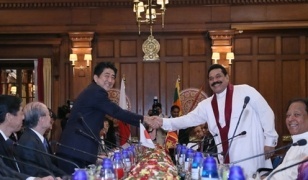Asia
Japan-Sri Lanka Summit Meeting
September 7, 2014
 Photo: Cabinet Public Relations Office
Photo: Cabinet Public Relations Office
Prime Minister Abe and President Rajapaksa held the summit meeting on September 7 from 3pm (local time) for about an hour, and the outline of the meeting is as follows:
1. Opening
At the beginning, President Rajapaksa mentioned that the first Japanese Prime Minister to visit Sri Lanka was Prime Minister Nobusuke Kishi, grandfather of Prime Minister Abe, and expressed his satisfaction with the progress made in many fields since the signing of the Joint Statement with Prime Minister Abe during his visit to Japan last year. Prime Minister Abe said that he feels deeply about making the visit to Sri Lanka, where his grandfather visited, as the first Japanese Prime Minister to do so in 24 years. He also expressed his intention to further strengthen the bilateral cooperative relationship by developing traditionally friendly relations to "A New Partnership between Maritime Countries."
2. Bilateral Relations
(1) President Rajapaksa said that it is important to enhance maritime cooperation including security as two maritime nations and that he is pleased that cooperation between security organizations of the two countries has been implemented. In response to this, Prime Minister Abe said that he concurs with the importance of strengthening cooperation in the maritime field and wants to establish the Japan-Sri Lanka Dialogue on Maritime Security and Oceanic Issues. Prime Minister Abe also said that Japan has decided to start a survey with a view to providing patrol vessels as well as to cooperate in human resource development for the Sri Lanka Coast Guard. Furthermore, Prime Minister Abe mentioned that he would like to promote high level policy dialogue between the Ministries of Foreign Affairs of both countries in order to further develop the Japan-Sri Lanka relationship.
(2) President Rajapaksa said that he hopes for more investment in Sri Lanka by Japanese companies and intends to improve investment environment. He also said that the Japan External Trade Organization (JETRO) plays an important role in helping Japanese companies enter Sri Lanka. In response to this, Prime Minister Abe said that he wants to expand bilateral investment and trade through economic consultations between the two governments and requested the improvement of investment environment. He also said that he would like to gain Sri Lanka's cooperation for implementing concrete follow-ups of the discussions at the Public-Private Economic Forum.
(3) With regard to economic cooperation, President Rajapaksa expressed his gratitude for the significant role of Japan's cooperation in various areas including the construction of highways, schools and hospitals in improving the quality of life of the citizens of Sri Lanka. Prime Minister Abe mentioned that Japan has decided to provide yen loan amounting up to 13.7 billion yen for Degitalization of Terrestrial Television Broadcasting Project and wants to advance cooperation in the field of transportation infrastructure. President Rajapaksa expressed his expectation for Japanese cooperation toward the introduction of power generation using natural gas, and Prime Minister Abe said he would like to consider possible cooperation.
3. Regional Affairs and Other Issues
(1) Prime Minister Abe welcomed the efforts of Sri Lanka toward national reconciliation including the holding of elections in Northern Province and conveyed Japan's intention to be involved in this matter to encourage positive efforts. He also pointed out that confidence building with the international community is of utmost importance in realizing national reconciliation. President Rajapaksa responded that Sri Lanka has implemented various efforts toward national reconciliation and will continue its engagement and dialogue with the international community.
(2) With regard to regional situation and cooperation in the international arena, Prime Minister Abe explained Japan's Proactive Contribution to Peace and expressed his intention to continue to cooperate toward the regional cooperation in South Asia and strengthening connectivity. Both leaders decided to cooperate toward the concrete development of the United Nations Security Council Reform.
